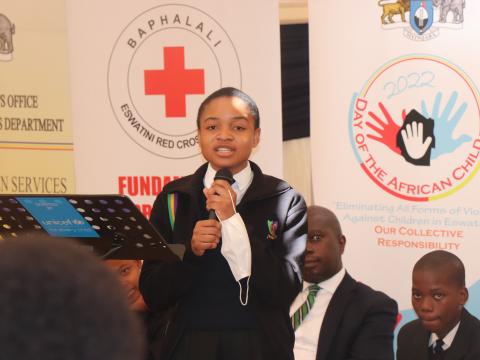“Please reconsider corporal punishment in schools”- Swazi national high school pupils

Matsapha- To commemorate the Day of the African Child, World Vision Eswatini and other child-funded organizations have been visiting schools in the country where they engaged the pupils in child-led discussions.
On 16 June 2022, pupils from Swazi National High School also had the chance to converse with the Deputy Prime Minister (DPM) Themba Masuku, where they asked him questions about the violence against children that exists in the country. This was in accordance with the Day of the African Child’s theme of the year, “Ending Violence Against Children”.
Over 1,000 pupils from the school gathered there and exchanged their views on this matter with the DPM. One of the pupils asked that the government reviews the law of corporal punishment that still subsists in schools because some feel abused.
“Are we still allowed to be beaten at schools? And if we are, what are the laws or the procedure that has to be followed?” one of the pupils asked.
In Eswatini, corporal punishment of children is still lawful despite recommendations to prohibit it by the Committee on the Rights of the Child, other Treaty Bodies, and during the 2nd cycle of UPR of Eswatini in 2016. Under international human rights law – the Convention on the Rights of the Child and other human rights instruments – states have an obligation to enact legislation to prohibit corporal punishment in all settings, including the home.
World Vision and Child Participation
Child participation is one of the core principles of the Convention on the Rights of the Child (CRC), which asserts that children and young people have the right to freely express their views and that there is an obligation to listen to children’s views and to facilitate their participation in all matters affecting them within their families, schools, local communities, public services, institutions, government policies, and judicial procedures.
At World Vision, we consider child and youth’s meaningful, safe, and appropriate participation a key strategic priority for ensuring sustained child well-being and creating democratic societies with informed and engaged citizens.